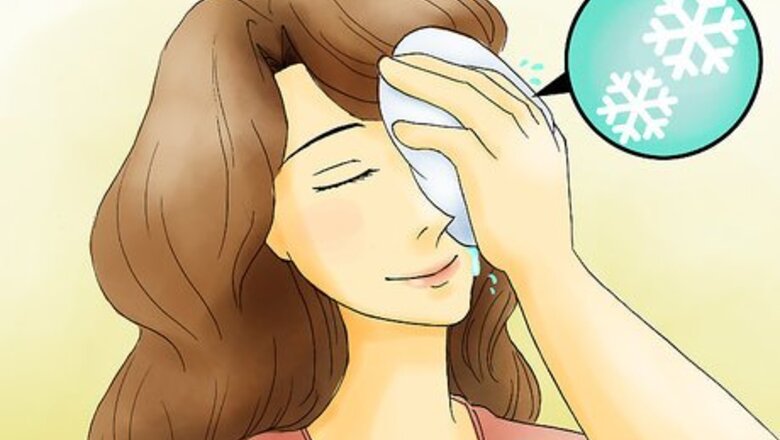
views
Cooling Down for Immediate Relief
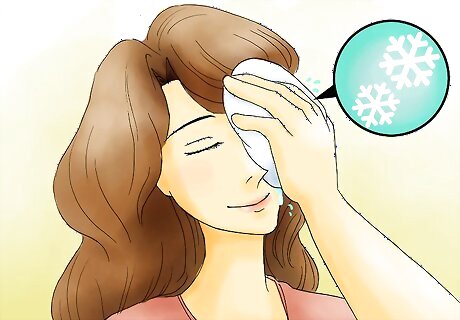
Apply a cool compress. Soak a clean, soft washcloth in cool water, ringing out the excess once drenched. Gently press the washcloth beneath and around your eyes, making sure to cover the entire bagged area. Continue for about five minutes. Do this while sitting upright to encourage any pooled fluids beneath your eyes to drain. The cold compress--and other cooling techniques--work by constricting the blood vessels responsible for discoloration and swelling beneath the eye.
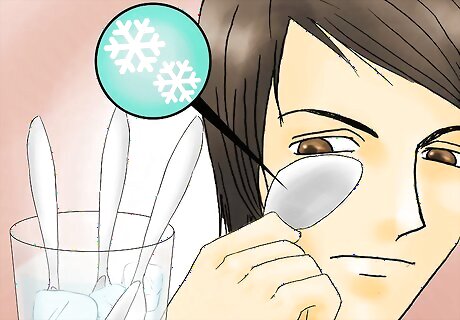
Press a cold spoon against your eyes. Place four stainless steel spoons in a cold glass of ice water; allow them to chill for two to four minutes. Remove one spoon and carefully apply it to the swollen, dark circle beneath your eye, pressing lightly. Keep it there until the spoon warms to the temperature of your skin. Return the used spoon to the ice water and take out a new spoon. Repeat this process with the bag beneath your other eye. Continue as needed, swapping out warmed spoons for chilled ones, for anywhere from 5 to 15 minutes, depending on how long it takes to reduce the appearance of both bags.
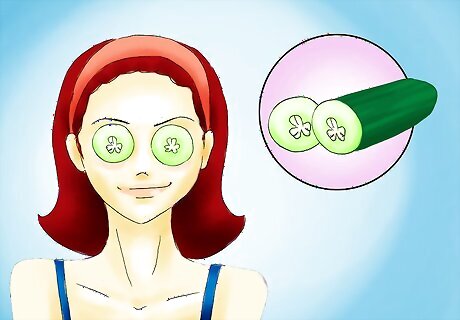
Cover your eyes with cucumbers. Cut two 1/2-inch (1.25-cm) thick slices of refrigerated cucumber and place them over each closed eye, making sure to cover the affected area. Relax in an upright position with your head slightly back for about 25 minutes. Since cucumbers have a high water content, they're naturally cool and hydrating, making them surprisingly great at relieving swollen eyes. Cucumbers also contain quercetin, an antioxidant that blocks histamine, which may reduce bags under the eye caused by allergies.
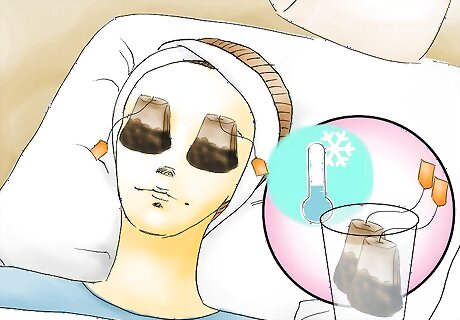
Use chilled tea bags. Dunk two tea bags in cold water, then place them in the refrigerator for about 15 minutes to get them even chillier. When they're ready, place the tea bags over closed eyes, covering the bagged area. Lie back with your head slightly elevated and continue treatment for 25 to 30 minutes. Afterward, wash your eyes and face with cool water and pat the skin dry. Avoid tea bags containing potent spices, like pepper or cinnamon, that may irritate your eyes. Chamomile tea and green tea have natural healing properties, making them ideal options. Caffeinated teas will also restrict the blood flow and relieve puffiness.
Quickly Addressing Underlying Issues
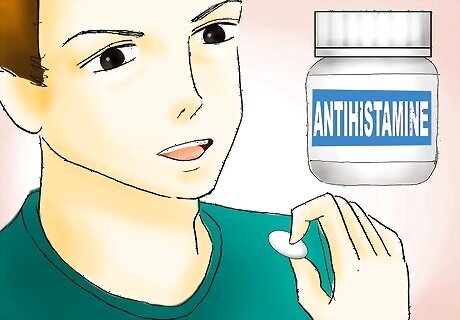
Take an antihistamine. Allergies are one possible reason you might have bags under your eyes. If you're experiencing other allergy symptoms, taking an over-the-counter antihistamine might be a worthwhile option to consider. Similarly, puffy bags can develop beneath your eyes during a cold or sinus infection. Over-the-counter medications meant to treat these conditions may help reduce bags under the eyes, too.
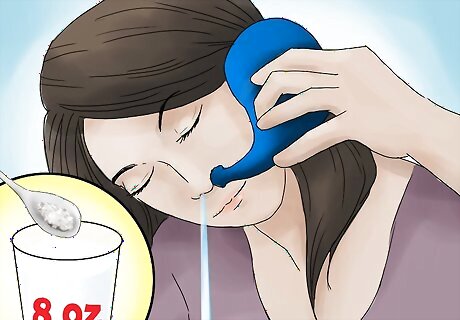
Flush out your sinuses. If sinus problems cause your puffy eyes but an antihistamine doesn't reduce those bags thoroughly enough, consider using a neti pot to flush out the extra fluid building up beneath your eyes. Dissolve 1/4 tsp (0.6 ml) finely ground non-ionized salt in 8 oz (250 ml) of warm water. Pour this solution into a clean neti pot, then tip your head to the side and use the neti pot to pour half the solution into one nostril. Tip your forehead lower to help the solution drain out of your other nostril. Repeat the same process using the other half of the solution, swapping sides to cleanse your sinus passages more thoroughly. You can also clear out your sinuses using a saline nasal spray.
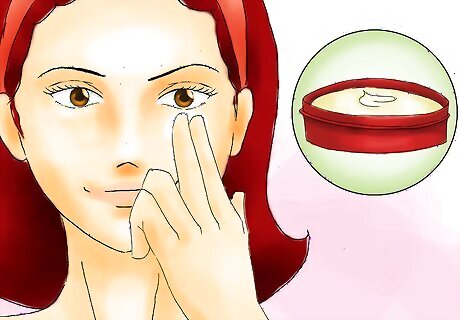
Apply eye cream. There are numerous eye creams formulated to help reduce puffy bags. Look for one that claims to be fast-acting for the quickest results. Retinol eye creams are a popular choice. While these creams work well in the long run by promoting collagen production, they may not provide immediate results. A better option for fast relief might be an eye cream with caffeine in it. Caffeine constricts the blood vessels responsible for inflammation and discoloration. Another possibility would be eye creams with Arnica, a natural anti-inflammatory ingredient.
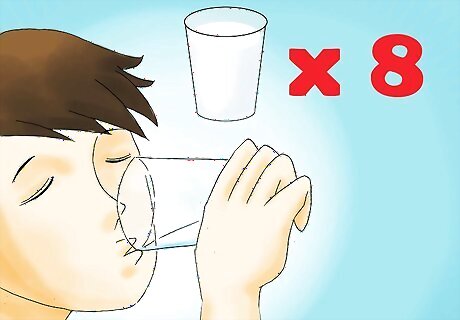
Stay hydrated. Make sure you're drinking the recommended eight 8-oz (250-ml) glasses of water per day. Puffiness beneath the eyes can be caused by water retention, but dehydration actually causes your body to retain more water. On a similar note, you should also cut back on foods and drinks that may worsen dehydration when dealing with bags beneath your eyes. This includes salty foods, alcohol, and caffeine.
Banishing Bags Overnight
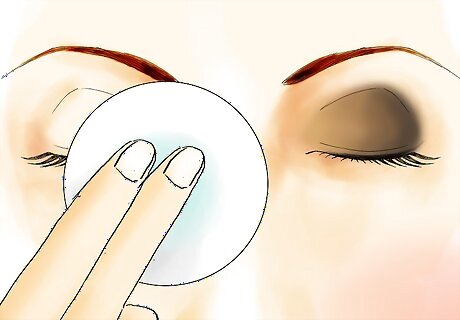
Remove any makeup. Before going to bed, thoroughly wash off any makeup you applied to your face earlier in the day. Eye makeup can cause your eyes to water while you sleep, which will increase the amount of puffiness you wake up with. If possible, try to use actual makeup remover to strip cosmetics from your skin before bed. Removers are specially formulated to cling to the makeup particles and lift them away, making them more effective than plain soap and water. If you don't have makeup remover, though, regular facial cleanser and plain water will still work. Just make sure that you keep washing until all eye makeup is completely gone.
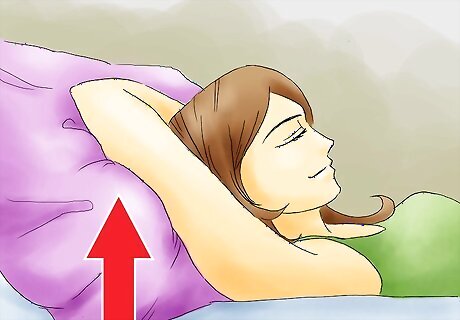
Sleep with your head elevated. Slide an extra pillow beneath your head before falling asleep. You could also prop up the head of your mattress or elevate the entire head of the bed. The main idea is simply to keep your head higher than the rest of your body. Keeping your head elevated should help drain excess blood, mucus, and other fluids away from your face, preventing them from pooling beneath your eyes and creating bags.
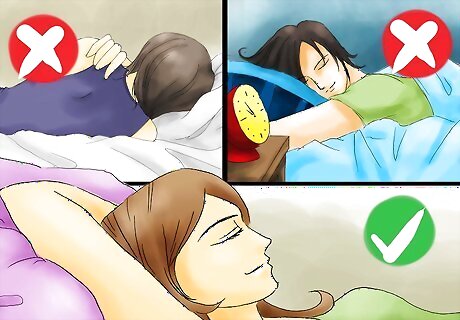
Lay on your back. If you sleep on your stomach or your side, switch to sleeping on your back for the night. By keeping your eyes facing up, you allow gravity to pull excess fluid away from your eyes instead of letting it gather there. If you think you'll naturally roll back onto your stomach or side during the night, try wedging pillows on the other side of your body to help reduce the amount of tossing and turning you can do.
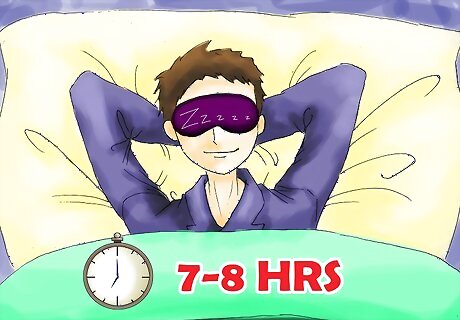
Get enough sleep. Poor sleep is one of the better-known causes of bags beneath your eyes. Plan ahead when choosing your bedtime so that you can get about seven to eight hours of sleep before your alarm goes off the next morning. Sleep deprivation causes your body to release cortisol, the "stress hormone," which can cause the collagen in your skin to break down. This makes the skin beneath your eyes weaker and more prone to dark circles.
Hiding Bags Using Cosmetics
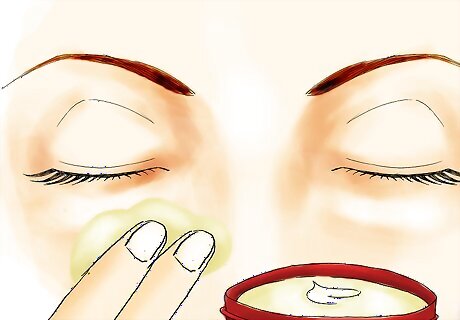
Apply eye cream. Before applying any makeup, dab some eye cream over the bags. Give it a few minutes to dry before continuing. Choose an eye cream the moisturizes. For an added boost, consider one containing retinol or caffeine. Do not use eye cream if you’re prone to getting styes. Regardless of the type you choose, the eye cream will help moisturize the skin and fill in any fine lines that could otherwise trap cosmetics.
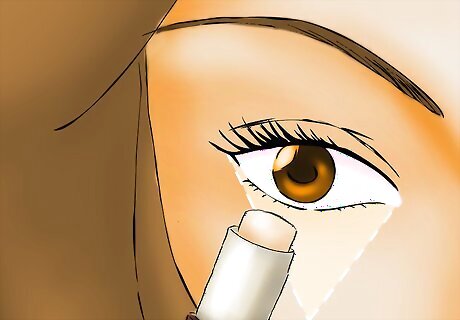
Cover the area with concealer. Lightly apply concealer that matches your skin tone over the bags beneath your eyes. Use the applicator or a brush to pat it on, but avoid rubbing it into the skin since doing so could cause further irritation For best results, choose a lightweight concealer with a creamy texture. Heavier concealers can sink into the fine lines beneath your eyes and highlight skin damage. Avoid using your fingers when applying concealer since doing so increases the risk of applying too much. A small, flat brush is your best option.
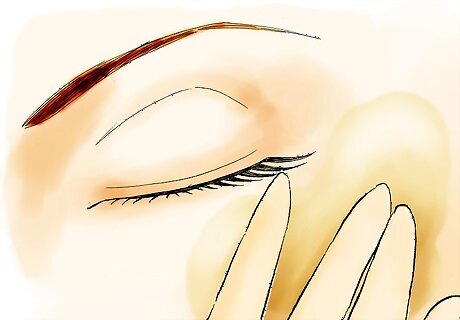
Carefully sweep on some bronzer. While only optional, adding a bronzer to your cheeks can help minimize the appearance of swollen bags beneath your eyes. Apply the bronzer to your cheeks and blend it upward to the area just beneath your eyes using a standard powder brush. The contrast created by the bronzer can help minimize the appearance of bags without covering them directly. Avoid bronzers with shimmer, however, since these can actually highlight bags.
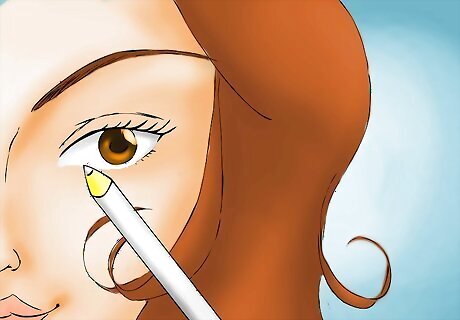
Use a light-colored eyeliner on your lower lid. Pick a white, cream, or light nude color and apply it to the inside of your lower lid. It will help your eyes look brighter, you’ll seem more awake, and it will distract attention away from your bags.
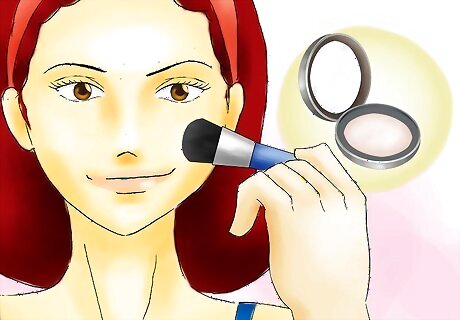
Top the area with powder. Use a brush with splayed bristles to lightly dust loose, translucent powder beneath your eyes and over your cheeks. The powder should help set your makeup and prevent it from gathering in the creases and fine lines of the skin around your eyes.




















Comments
0 comment